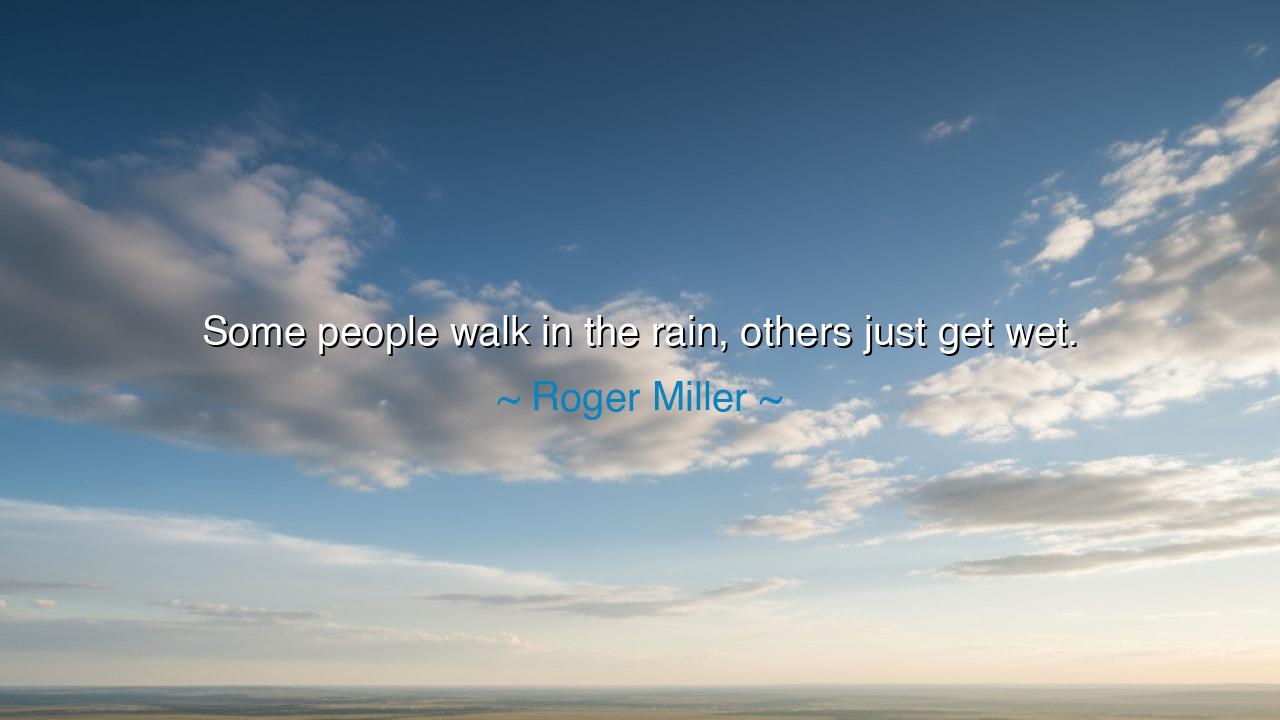
Some people walk in the rain, others just get wet.






Hear now, O seekers of meaning, the words of Roger Miller, singer of truth clothed in simple verse: “Some people walk in the rain, others just get wet.” At first, this utterance may sound like a jest, a playful phrase tossed into the air like a song. Yet within it lies a treasure of wisdom, a lesson for all who wander beneath life’s storms. For in every trial, in every hardship, in every pouring rain of fate, there are two kinds of souls: those who endure passively, and those who walk with spirit awakened, who transform adversity into experience, and sorrow into song.
The rain, in this saying, is more than water falling from the heavens. It is the symbol of hardship, of the unchosen trials of existence. Illness, loss, disappointment, rejection—these are the rains that drench the heart. One may stand beneath them resentfully, feeling only the chill, the inconvenience, the misery. Such a one merely “gets wet.” But another, wiser soul may step into the same storm with eyes open, listening for its rhythm, tasting its freshness, letting it cleanse the spirit. Such a one walks in the rain—finding in hardship not only pain, but poetry.
Think of the great soul Helen Keller, born blind and deaf, surrounded by a darkness few can imagine. For many, such a fate would mean only sorrow, only “getting wet” beneath the storm of disability. Yet Keller, guided by the fierce devotion of her teacher Anne Sullivan, chose to walk in the rain of her own life. She learned to read, to speak, to write, and to inspire millions with her courage. Her life was proof that hardship need not drown a person—it can also awaken greatness, if one dares to embrace it.
So too did the poet Matsuo Bashō, master of haiku, walk in the rain of life. Wandering Japan in poverty, enduring loneliness and hunger, he did not curse his path. Instead, he transformed the hardships into verses of stillness and beauty, capturing the sound of rain upon leaves, the fleeting light of fireflies, the whisper of wind through reeds. Where others would have seen only struggle, he saw revelation. Thus his poetry lives on, carrying to future generations the lesson that even the storm holds hidden music for those willing to listen.
From Miller’s words comes this teaching: life is not defined by what falls upon us, but by how we choose to walk beneath it. The storm comes to all, but not all souls respond the same. One bends low, shivering, waiting for it to end. Another lifts their face to the sky and finds wonder in the drops. The difference lies not in the storm, but in the spirit.
Therefore, O children of tomorrow, learn to walk in the rain. When hardship comes, do not see only ruin. Ask: What lesson does this storm carry? What strength may I gain from it? What beauty hides within it? To walk in the rain is to live with eyes open, to let life touch you deeply, to transform each trial into a teacher.
Practical is this counsel: the next time life drenches you—whether through rejection, sorrow, or failure—pause and breathe. Do not curse the storm, but look for its hidden gift. Write of it, sing of it, reflect upon it until it yields its meaning. Walk deliberately through it, instead of stumbling blindly. In this way, every hardship becomes not only endurable, but fruitful.
Thus remember the words of Roger Miller: “Some people walk in the rain, others just get wet.” Choose to be among those who walk, not merely endure. For the rain will come whether you will it or not—but how you meet it will determine whether you emerge diminished or strengthened, drowned or reborn.






AAdministratorAdministrator
Welcome, honored guests. Please leave a comment, we will respond soon